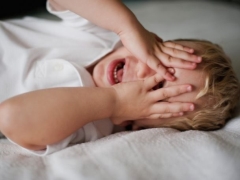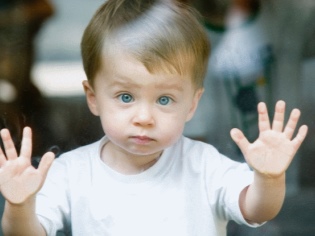Mental disorders in children
Mental disorders can complicate a person’s life even more than obvious physical defects. Particularly critical is the situation when a small child suffers from an invisible malady, whose whole life is ahead, and now there must be a rapid development. For this reason, parents should be guided in the subject, closely monitor their children and respond quickly to any suspicious phenomena.
Causes
Children's mental illnesses do not arise from nowhere - there is a clear list of criteria that do not guarantee the development of a disorder, but contribute greatly to it. Separate diseases have their own causes, but mixed specific disorders are more characteristic of this area, and indeed it’s not about the choice or diagnosis of the disease, but about the general causes of occurrence. It is necessary to consider all possible causes, without dividing by the disorders they cause.
Genetic predisposition
This is the only completely inevitable factor. In this case, the disease is due to the initially incorrect functioning of the nervous system, and Gene disorders are not known to be cured - doctors can only mute the symptoms.
If among the close relatives of the future parents there are cases of serious mental disorders, it is possible (but not guaranteed) that they will be passed on to the baby. However, such pathologies can manifest themselves even at preschool age.
Limited mental abilities
This factor, which is also a kind of mental disorder, can adversely affect the further development of the body and provoke more severe illnesses.
Brain damage
Another extremely common cause, which (like gene disorders) interferes with normal brain function, but not at the genetic level, but at the level seen in an ordinary microscope.
First of all, this includes head injuries received in the first years of life, but some children are not so lucky that they have time to be injured before birth - or as a result of difficult childbirth.
Violations can also be provoked by an infection that is considered more dangerous for the fetus, but can also infect the baby.
Bad habits of parents
Usually indicate the mother, but if the father was not healthy because of alcoholism or a strong addiction to smoking, drugs, it could also affect the health of the child.
Experts say that the female body is especially sensitive to the destructive effects of bad habits, so women are generally undesirable to drink or smoke, but even a man who wants to conceive a healthy child must first refrain from such methods for several months.
Pregnant woman to drink and smoke is strictly prohibited.
Permanent conflicts
When they say that a person is capable of going crazy in a complex psychological environment, this is not at all an artistic exaggeration.
If an adult does not provide a healthy psychological atmosphere, then for a child who does not yet possess either a developed nervous system or a correct perception of the surrounding world, this can be a real blow.
The most common cause of pathologies are conflicts in the family, since the child is there most of the time, he has nowhere to go from there. However, in some cases, an unfavorable situation in a circle of peers - in the yard, in kindergarten or school can play an important role.
In the latter case, the problem can be solved by changing the institution that the child attends, but for this you need to understand the situation and begin to change it even before the consequences become irreversible.
Types of diseases
Children can get almost all the mental illnesses that adults are exposed to, but kids also have their own (especially childish) diseases. In this case, the exact diagnosis of a disease in childhood is much more complicated. Affect the features of the development of children, whose behavior is already very different from similar in adults.
Not in all cases, parents can easily recognize the first signs of a problem.
Even doctors usually make a definitive diagnosis not earlier than a child of primary school age, using very vague, too general concepts to describe an early disorder.
We present a generalized list of diseases, the description of which for this reason will not be perfectly accurate. In some patients, individual symptoms will not appear, and the mere presence of even two or three signs will not mean mental impairment. In general, a summary table of childhood mental disorders looks like.
Mental retardation and developmental delay
The essence of the problem is quite obvious - the child is physically developing normally, but in terms of mental and intellectual level, he is significantly lagging behind his peers. It is possible that he will never reach the level of at least an average adult.
The result can be mental infantilism, when an adult behaves in a literal sense like a child, with a preschooler or a junior schoolchild. Such a child is much harder to learn, it can be caused by a bad memory, or the inability to focus on a particular subject at will.
To divert the kid from learning can the slightest extraneous factor.
Attention Deficit Disorder
Although by name this group of diseases can be perceived as one of the symptoms of the previous group, the nature of the phenomenon here is completely different.
A child with this syndrome in mental development does not lag behind, and the typical hyperactivity for him is perceived by most people as a sign of health. However, it is precisely in excessive activity that the root of evil lies, since in this case it has painful features - there is absolutely no occupation that the child would love and bring to the end.
If high activity is not strange for small children, then here it is hypertrophied to the extent that the kid can not even wait for his turn in the game - and for this reason can throw it without completing it.
It is obvious that forcing such a child to study diligently is extremely problematic.
Autism
The concept of autism is extremely broad, but is generally characterized by a very deep withdrawal into one’s own inner world. Many people believe autism form of backwardness, but in some forms the potential of teaching such children is not very different from their peers.
The problem lies in the impossibility of normal communication with others. If a healthy child learns absolutely everything from those around him, then an autist receives much less information from the outside world.
Obtaining a new experience is also a serious problem, since children with autism have a very negative perception of any abrupt changes.
However, autists are even capable of independent mental development, but it simply goes slower - due to the lack of maximum opportunities for obtaining new knowledge.
"Adult" mental disorders
This should include those ailments that are considered relatively common among adults, but in children are quite rare. A noticeable phenomenon among adolescents are various manic states: megalomania, persecution, and so on.
Pediatric schizophrenia affects only one child among fifty thousand, but scares the scale of the regression in mental and physical development. Due to pronounced symptoms, Tourette's syndrome also became known, when the patient regularly uses obscene language (uncontrolled).
What should parents pay attention to?
Psychologists with extensive experience claim that absolutely healthy people do not exist. If in most cases minor oddities are perceived as a peculiar, but not particularly disturbing character trait, then in certain situations they can become a clear sign of a future pathology.
Since the systematics of mental illness in childhood is complicated by the similarity of symptoms in fundamentally different disorders, it is not necessary to consider alarming oddities in relation to individual diseases. It is better to submit them in the form of a general list of alarming "bells".
It is worth recalling that none of these qualities is a 100% sign of mental disorder - unless a hypertrophied, pathological level of development of the defect is observed.
So, a bright manifestation of the following qualities in a child can be a reason for going to a specialist.
Increased cruelty
Here it is necessary to distinguish child cruelty caused by a lack of understanding of the degree of discomfort caused, and the enjoyment of purposeful, perceived infliction of pain — not only to others, but also to oneself.
If a child at the age of about 3 years pulls a cat by the tail, then he learns the world in this way, but if at school age he checks her reaction to an attempt to tear off her paw, then this is clearly not normal.
In cruelty, the unhealthy atmosphere at home or in the company of friends is usually expressed, but it can either go away by itself (under the influence of external factors) or give irreparable consequences.
Fundamental refusal to eat and hypertrophied desire to lose weight
Concept anorexia in recent years, hearsay - it is a consequence of low self-esteem and a desire for an ideal that is so exaggerated that it takes on ugly forms.
Among children with anorexia, almost all are teenage girls, but one should distinguish between normal body tracking and bringing oneself to exhaustion, since the latter has an extremely negative effect on the body’s work.
Panic attacks
Fear of something may look altogether normal, but have an unreasonably high degree. Relatively speaking: when a person is afraid of heights (falling), standing on a balcony is normal, but if he is afraid to be even just in an apartment, on the last floor is already a pathology.
Such unreasonable fear not only interferes with normal life in society, but can also bring to more serious consequences, in effect creating a difficult psychological situation where there is none.
Pronounced depression and suicidal tendency
Sadness peculiar to people of any age. If this is delayed for a long time (for example, a couple of weeks), the question arises about the reason.
Children have virtually no reason to fall into depression for such a long period, so it can be perceived as a separate disease.
The only common basis for childhood depression may be difficult psychological situation however, it is just the cause of the development of many mental disorders.
By itself, depression is dangerous propensity to self-destruction. There are many people who think about suicide at least once in their life, but if this topic takes the shape of a hobby, there is a risk of trying to hurt yourself.
Mood shifts or changes in habitual behavior
The first factor indicates the shakiness of the psyche, its inability to resist in response to certain stimuli.
If a person behaves like this in everyday life, then his reaction in an emergency situation may be inadequate. In addition, by constant attacks of aggression, depression or fear, a person is able to harass himself even more, and also has a negative effect on the mental health of others.
A strong and dramatic change in behavior that does not have a specific rationale, indicates more likely not the appearance of a mental disorder, but an increased likelihood of such an outcome.
In particular, a person who suddenly became silent probably experienced severe stress.
Excessive hyperactivity that interferes with concentration
When a child is very mobile, it does not surprise anyone, but he certainly has some kind of occupation that he is willing to devote a long time. Hyperactivity with signs of impairment is when a child cannot even play active games for a long enough time, not because he is tired, but simply because of a sharp shift in attention to something else.
It is impossible to affect such a child even with threats, and in fact he faces reduced opportunities for learning.
Negative social phenomena
Excessive conflict (up to regular physical assault) and the tendency to addictive habits in themselves can simply signal the presence of a complex psychological environment that the child is trying to overcome in such unattractive ways.
However, the roots of the problem can be in something else. For example, constant aggression can be caused not only by the need to defend oneself, but also by the increased cruelty mentioned at the top of the list.
The nature of the suddenly manifested abuse of something is quite unpredictable in general - it can be either a deeply hidden attempt at self-destruction, or a banal escape from reality (or even psychological attachment bordering on mania).
At the same time, alcohol and drugs never solve the problem that led to their passion, but they have a detrimental effect on the body and may contribute to further degradation of the psyche.
Treatment methods
Although mental disorders are clearly a serious problem, most of them can be corrected - up to complete recovery, whereas a relatively small percentage of them are incurable pathologies. Another thing is that treatment can last for years and almost always requires the maximum involvement of all people surrounding the child.
The choice of the method strongly depends on the diagnosis, and even very similar in symptoms of the disease may require a fundamentally different approach to treatment. That is why it is so important to describe as accurately as possible to the doctor the essence of the problem and the symptoms observed. The main emphasis should be made on the comparison "it was and has become," to explain why it seems to you that something went wrong.
Most relatively simple diseases are treated by ordinary psychotherapy - and only by it. Most often, it takes the form of a child’s personal conversations (if he has already reached a certain age) with a doctor, who in this way gets the most accurate picture of how the patient himself understands the problem.
The specialist can assess the scale of what is happening, find out the reasons. The task of an experienced psychologist in this situation is to show the child hypertrophied causes in his mind, and if the reason is really serious, try to distract the patient from the problem, give him a new stimulus.
At the same time, therapy can take different forms - for example, autistic and schizophrenics locked in themselves are unlikely to support the conversation. They may not make contact with a person at all, however, they usually do not refuse close contact with animals, which ultimately can increase their sociability, and this is already a sign of improvement.
Medication use It is always accompanied by the same psychotherapy, but already indicates a more complex pathology - or about its greater development. Children with impaired communication skills or slow development are given stimulants to increase their activity, including cognitive.
With a pronounced depression, aggression or panic attacks are prescribed antidepressants and sedatives. If the child shows signs of painful mood swings and seizures (up to hysterics), use stabilizing and antipsychotic drugs.
Inpatient - the most difficult form of intervention showing the need for continuous monitoring (at least during the course). This type of treatment is used only for the correction of the most severe disorders - for example, schizophrenia in children. Ailments of this kind are not treated at once - the little patient will have to repeatedly go to the hospital. If positive changes are noticeable, such courses will become more rare and short over time.
Naturally, during treatment, the child should be created as favorable as possible. environment that eliminates any stress. That is why the fact of having a mental illness does not need to be hidden - on the contrary, educators in kindergarten or school teachers need to know about it in order to properly build the educational process and teamwork.
It is completely unacceptable to tease or reproach a child with his disorder, and indeed it is not worth mentioning him - let the baby feel normal.
But a little more love him, and then with time everything will fall into place. Ideally, it is better to react before any signs appear (by prophylactic methods).
Achieve a stable positive atmosphere with your family and build trust with your child so that he could at any time rely on your support and was not afraid to tell about any unpleasant phenomenon for him.
For more information on this topic, you can find out by watching the video below.




































